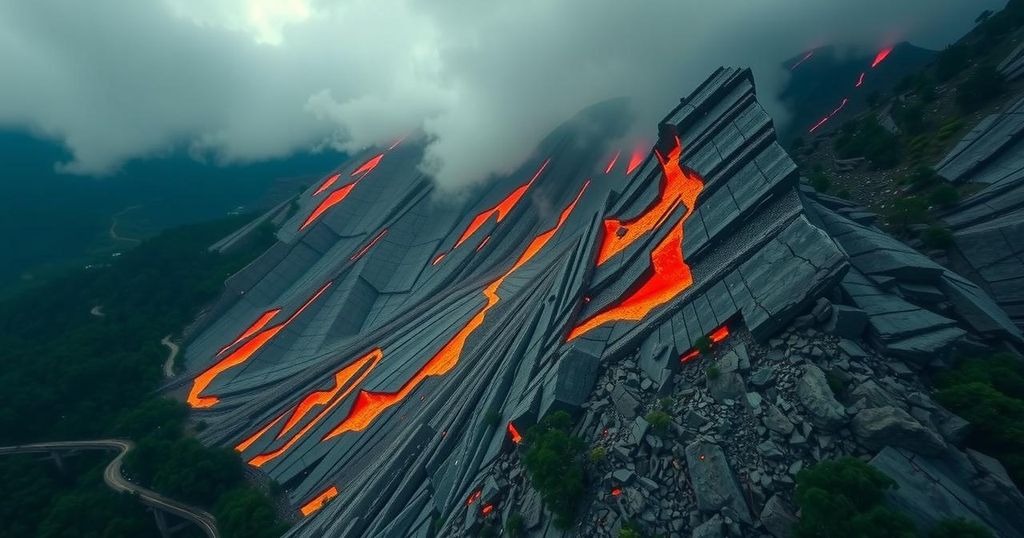Copper Reserves Revealed by Mountain Collapse in Congo Amidst Human Rights Concerns
A mountain collapse in the DRC’s Katanga region unveiled extensive copper deposits, prompting mixed reactions online about the nation’s poverty and concerns over potential Western exploitation. Mining activities have long posed human rights challenges, as highlighted by Amnesty International’s recent report on abuses associated with resource extraction. The region is pivotal in global copper production, yet local communities often suffer from exploitation despite the wealth generated by their resources.
A recent mountain collapse in the Katanga region of the Democratic Republic of Congo (DRC) has uncovered substantial copper reserves, captured in a viral video that depicts the dramatic event. While some social media observers expressed concern over the nation’s persistent poverty, others fear the potential exploitation of these resources by Western powers. The DRC, endowed with vast mineral wealth, historically reveals stark disparities between its resources and the socioeconomic status of its populace. Copper dominates the economy, yet associated mining activities have sparked accusations of human rights abuses, particularly as international demand for clean energy solutions rises. The Katanga region is situated within Africa’s renowned copper belt, featuring significant copper deposits critical to global markets. Historically, this area was the world’s leading copper producer in the mid-20th century when its mining activities flourished. Currently, it is a crucial source for over ten percent of global copper, predominantly harvested from Late Precambrian sedimentary deposits. Although mining bolsters local economies by creating employment and enhancing infrastructure, it often comes with dire social consequences. Recent reports from Amnesty International indicate that the expansion of copper and cobalt mining has resulted in forced evictions and human rights violations. “The forced evictions taking place as companies seek to expand industrial-scale copper and cobalt mining projects are wrecking lives and must stop now,” stated Agnès Callamard, Secretary General of Amnesty International. This highlights a historical pattern of exploitation dating back to colonial times, with contemporary extractive practices continuing to impact local communities negatively. Amidst rising global demand for lithium-ion batteries, driven by the transition towards renewable energy sources, concerns over environmental and social justice remain paramount. While organizations recognize the necessity of such resources in combating climate change, they call for a balanced approach that prioritizes human rights alongside environmental objectives. The push for a just transition emphasizes the need to decouple clean energy initiatives from the underlying social injustices that persist in resource extraction. This situation in the DRC underscores the critical challenges faced by resource-rich nations, where wealth extraction often occurs without equitable benefits for local populations. There is a growing consensus that to assure sustainable development, countries must nationalize their mineral resources and ensure that all profits contribute to the public good, such as accessible healthcare, education, and adequate housing. As the international community continues to advocate for ethical mining practices, the DRC’s fate remains a critical example of the complex interplay between natural resource management and human rights advocacy.
The Democratic Republic of Congo is endowed with vast natural resources, predominantly copper and cobalt, which are critical to the global supply chain, especially for clean energy technologies. The Katanga region is particularly significant due to its historical prominence in copper mining, contributing a notable share of the world’s copper deposits. Despite its resource wealth, the DRC grapples with extreme poverty, with many citizens not benefiting from its mineral wealth. The juxtaposition of rich natural resources and poverty illustrates systemic issues linked to historical exploitation and contemporary corporate practices. Recent activism highlighted by organizations like Amnesty International underscores the urgent need for human rights advocacy in resource extraction contexts.
The mountain collapse in the DRC revealing significant copper reserves serves as a stark reminder of the resource wealth juxtaposed with persistent poverty and social injustice experienced by local communities. The international response, particularly concerning corporate ethics and human rights, will be pivotal in determining the future trajectory of resource management in the region. Efforts towards nationalization and equitable resource distribution are essential to ensure that the local population benefits from its natural wealth, aligning with calls for just transitions in resource extraction.
Original Source: www.livemint.com




Post Comment